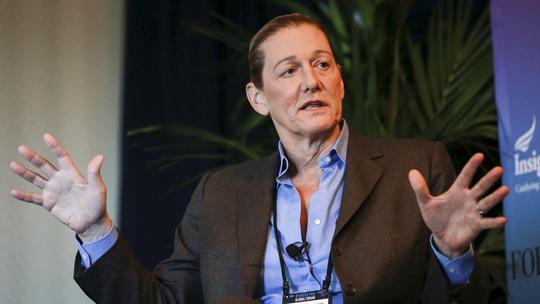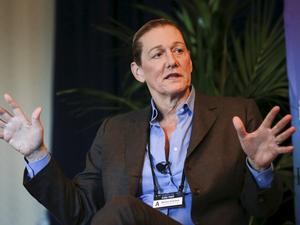
Silver Spring’s United Therapeutics Corp. plans to buy a Food and Drug Administration voucher for $105 million to speed up the regulatory approval process for its inhaled treatment for pulmonary arterial hypertension.
The biotech has reached a definitive agreement to acquire what’s called a Priority Review Voucher, or PRV, to accelerate the FDA’s review of Tyvaso DPI — an inhaler that dispenses a dry powder form of PAH drug treprostinil.
The voucher, which UT will purchase from New York biopharma Y-mAbs Therapeutics Inc. (NASDAQ: YMAB), cuts down the review period from a year to eight months. United Therapeutics (NASDAQ: UTHR) said Monday that following the close of the transaction, which is subject to customary conditions, it intends to file the voucher with its new drug application for Tyvaso DPI in the first half of 2021, opening the door to a new version of its second-most lucrative drug.
The local company is developing the product with Westlake Village, California-based MannKind Corp. (NASDAQ: MNKD), following a license agreement the parties formed in 2018.
With its application, United Therapeutics expects to seek approval for Tyvaso DPI for patients both with PAH and with associated interstitial lung disease, who “currently have no treatment options,” Dewey Steadman, UT’s head of investor relations, said in an email to the Washington Business Journal. “The PRV allows us to bring Tyvaso DPI to PAH patients as quickly as possible.”
It's also key to United Therapeutics's income. The company has seen sales of its existing Tyvaso formulation rise year over year to $351.6 million for the first nine months of this year, or nearly a third of its total revenue in that time period, while its biggest-selling drug, Remodulin, has seen its sales flag in that time in the face of generic competition.
Vouchers encourage rare disease work
The FDA grants PRVs to encourage the development of treatments for rare tropical and pediatric diseases, as well as medical countermeasures, that companies might not otherwise pursue because of a smaller potential market. Y-mAbs originally secured the voucher it is selling — a rare pediatric disease voucher — when the FDA approved Danyelza, a treatment for refractory/relapsed high-risk neuroblastoma, a cancer of the adrenal glands that typically affects young children.
But the PRV “can be applied to any indication, not just for pediatrics,” Steadman said. “Tyvaso is not indicated for patients under 18 years of age.”
United Therapeutics has been on the other side of such a voucher transaction in the past. In August 2015, it sold a PRV to Chicago’s AbbVie Inc. (NYSE: ABBV) for $350 million. The Montgomery County biotech had received the voucher when the FDA approved its neuroblastoma treatment Unituxin earlier that year.
The new Tyvaso device “is expected to be a major advancement in the delivery of inhaled treprostinil therapy, offering substantial convenience compared to the existing Tyvaso nebulizer,” UT President and Chief Operating Officer Michael Benkowitz said in a statement.
Tyvaso, which opens the blood vessels in the lungs so more blood can flow into them, first earned market approval in 2009 to improve exercise ability for PAH patients. It’s also now under FDA review as a treatment for PAH associated with interstitial lung disease, for which UT has said it expects a response by April 2021.
Several more developments to come in 2021
The Maryland drugmaker is also studying treprostinil, the active ingredient in Tyvaso and multiple other products, as an inhaled form for other uses. Earlier in December, the FDA granted orphan drug status to treprostinil as a treatment for patients with idiopathic pulmonary fibrosis, a type of interstitial lung disease that hinders breathing and scars the lungs. UT is preparing to start a late-stage clinical trial of Tyvaso for patients with IPF. That win from regulators followed a clinical trial in February that showed Tyvaso was effective in increasing the distance patients with interstitial lung disease could walk.
Both developments clear a path for UT to expand further beyond its core PAH business, into the pulmonary fibrosis space — important as generic competition increasingly threatens the business for some of its existing products. The company is also studying Tyvaso in patients with pulmonary hypertension resulting from chronic obstructive pulmonary disease, or COPD, which blocks airflow and makes breathing difficult.
Heading into 2021, the biotech is looking to “several transformative events,” Steadman told the Washington Business Journal. In addition to further developments for Tyvaso, the company plans launches of the Remunity pump for Remodulin, the company's flagship PAH drug, and the implantable system for Remodulin, which were both delayed. The company also expects to enroll patients in a phase 3 study of oral PAH therapy Ralinepag.


